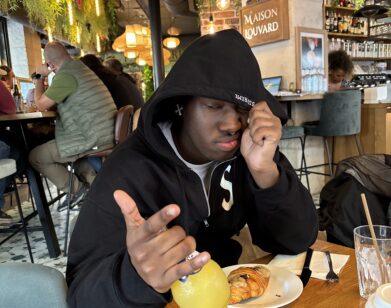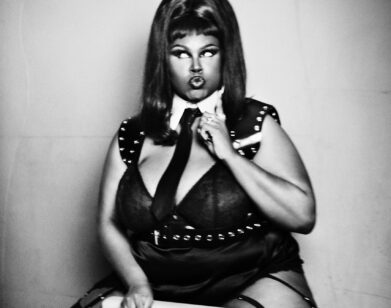The Wonderful World of AZ

AZ
Anthony Cruz (better known as AZ) is often called underrated—but perhaps even more than that, he’s misunderstood. To the majority of people, he’s known as Nas’s most frequent collaborative partner. His verse on Illmatic‘s “Life’s a Bitch” is deservedly lauded; it more than holds its own on one of hip-hop’s landmark albums. But to a smaller band of followers, AZ is celebrated as a marvelously clever lyricist whose melodious flow is delivered with such percussive variation, it is more instrumental than vocal. Listening to his music is akin to rushing around a gallery of classic paintings—it is so dense with meaning, it rewards only diligent scrutiny. His lyrics need to be listened to repeatedly; it even helps to read them. AZ’s localized vernacular, quick reportage, and exotic intonation (possibly picked up from his Dominican father) combine to make a poisonous blend to commercial enterprise—even if to some listeners, the same qualities make it a form of antidote to the same.
AZ is misunderstood because his early career, littered with references to money and world domination, easily distorts perceptions of how his life has panned out. He’s become commercially inflexible rather than commercially unsuccessful. He can certainly make records with broad appeal. Listen to “Sugar Hill” (Doe or Die): it is AZ reducing the speed of his rhymes, each verse divided by Miss Jones’s neatly forged hook. Doe or Die went platinum. Up until AZ went independent with A.W.O.L in 2005, all of his albums reached the top five in the Billboard R&B/Hip-Hop chart. His independence coincided with the era of easily ripped digital music. It made the industry tougher for all artists. But in any case, AZ is not equipped for image-focused mainstream success—and all things considered, he’s quite happy with his lot.
NICHOLAS MALTBY: How are you doing?
AZ: Oh man, listen, any day above ground is a good one; so I guess I’m in a good state of mind right now!
MALTBY: Let’s begin with Illmatic and your long-term association with Nas. “Life’s A Bitch” is obviously a great track, but personally I love the word “schweppervesence.” Does it come from the whole Schweppes advertising thing?
AZ: “Schweppervesence” was just fresh and bubbly and it came, I think, from the commercial. I remember the commercial came on so much when I was young, and the word itself just sounds crazy coming out your mouth, and when I was writing that particular verse, it just came into my mouth and my mind, and it fit the topic at hand.
MALTBY: It’s just a marvelous word. Do you ever listen to Illmatic for pleasure?
AZ: I listen to Illmatic all the time. A classic can never become dated: classic is just timeless, and Illmatic captured what the culture at that time was about; I always listen to the old classics. Illmatic is one of my favorite classics. I listen to it up to this day, because it really just gives you a vibe, and music is for the soul anyway—when you listen to certain music and certain classics, if it captures the era, it brings you back to that time. And you feel it, you don’t just listen to it.
MALTBY: So how did you and Nas actually meet?
AZ: Me and Nas were introduced on the phone, actually, because back then there was a lot of comparison of who’s the best in the boroughs, and my friend knows his friend, and it’s just like we’re all on the phone; and there was a couple of other people on the phone, just talking, and we met like that. So actually we spoke for like a year by phone, before we actually saw each other. And he was recording, and I had no idea about the studio process and all of that—I was just coming through for support, and that’s how that “Life’s a Bitch” record took place. It wasn’t premeditated.
MALTBY: Over the phone, was there any competitive edge between the two of you as hotly tipped MCs?
AZ: Ah, no, it was like five people on the phone, and everybody clicked because it wasn’t about music: it was about what was going on in the neighborhoods, and this person just got hurt. And you know, his [Nas’s] friend was getting locked up, and my friend was getting locked up; so that’s what the conversation was about.
MALTBY: With The Firm, did collaborating with other group members diminish your own creative impact? Did you mind that side of it?
AZ: No, I didn’t mind. Foxy was a female, and Nature and Cormega was like newcomers to the game. Me and Nas was always doing what we was doing in the game: we call it co-defendants, meaning: him being my right-hand in the music business, and me coming in the same time he came in. So it was a comfortable atmosphere. It wasn’t strenuous at all; it was a good vibe.
MALTBY: Do you feel that that album has received more criticism than it deserved?
AZ: It was just too many hands in the pot. And a lot of people wanted to see that album fail, because it was too much power going through one unit. But it did good, it left its niche: as far as the legacy of hip-hop goes, it earned its place. For a first effort, it was good.
MALTBY: I feel that you’ve improved quite a lot technically since Doe or Die. It’s something you’ve also said. Where do you feel that you’ve improved?
AZ: Lyrically, I think I’ve improved. I can speak on broader topics, I can express myself better. And picking the choice of music to fit my lyrics, I think I’ve done a great job with that.
MALTBY: Who are the producers that you’ve enjoyed working with?
AZ: Working with Premier was a beautiful thing; I worked with him on the D’Angelo remix, which was my first time really working with him. I’ve been around him and his production with what he was doing with Nas, and a couple of other people and Gang Starr, I worked with him with “The Come Up,” which was a beautiful thing, which led to The Format. I always loved Pete Rock production. I was blessed to be a part of that. Buckwild always brought a sound to the table from Doe or Die or with “I’m Back,” which was great. Just experience in the studio with Dr. Dre was a good look.
MALTBY: Do you trace your flow to people like Kool G Rap?
AZ: Yeah, I would say G Rap and Kane, Rakim, Slick Rick. They came from that culture, and they opened the doors up for us.
MALTBY: And as for gangsta rap—it’s generally a title misunderstood by the media. Would you, earlier in your career, have happily associated yourself with gangsta rap, when what you’re talking about in it is almost universally criminal?
AZ: I don’t think it was criminal. Well, I suppose the dialect was. But I always spoke about trying to get up out of it. I never spoke about celebrating it.
MALTBY: But you still talk about selling drugs?
AZ: I came from that, but I always talk about survival. The reason I talk the language is ’cause there are two ends to everything. I never glorified it or indulged it: I always talked about doing it if need be to get where you had to go, to survive or take care of your family. So, I spoke about gangsta rap from another angle. I would never feel ashamed that music has that dialogue in it. It’s real. You gotta go through it, you can’t go round it. So in that sense, I’m glad if they title me with gangsta rap.
MALTBY: Do you think offering a persona is important to commercial success?
AZ: Yes, very important. It’s very important to add gimmicks for commercial success. It makes sense because you’re easily identified through it. And you separate yourself from other MCs. For me, it was one of my flaws because I could never adapt an image to sell records—because for me, it’s like selling my soul. I’m only here to sell music and express myself. It’s needed to sell records, though.
MALTBY: You used the word “flaw.”
AZ: It’s not a flaw. In “the music industry” it’s a flaw; for me, it’s a plus for me to be me, and remain me.
MALTBY: You now have quite a long association with Wu-Tang. There is obvious common ground, but how would you define it?
AZ: I love Wu-Tang’s music. They represent what I represent. I love RZA’s production.
MALTBY: How did you enjoy making “Legendary Weapons”?
AZ: Well, like I said, I love the Wu-Tang sound, so anything with them, I would always want to be a part of. So when I did hear the track, I think I just wrote that verse right there on a whim. I appreciated it. I really didn’t put much thought into it, but I just went on a vibe. That particular verse is in and of the moment. That’s the best part of certain records when you record them, because I do love the track myself, and Fame did well with it as well. I love it. It sounds like Fame was on a vibe too right there, like his verse wasn’t nothing premeditated.
MALTBY: So finally, is life still a bitch for you?
AZ: Life is always a bitch. [laughs] Life is always a bitch. If it’s not one thing, it’s another. But that’s what makes life exciting, you know; it builds character, it builds motivation, and only the strong survive. So “Life’s a Bitch” will always be in my head, ’cause it will always make a better me.
THIS SATURDAY, AZ JOINS NAS AT THE ROCK THE BELLS VISTIVAL ON GOVERNOR’S ISLAND TO PERFORM FROM ILLMATIC. FOR MORE ON AZ, VISIT HIS MYSPACE.






